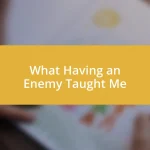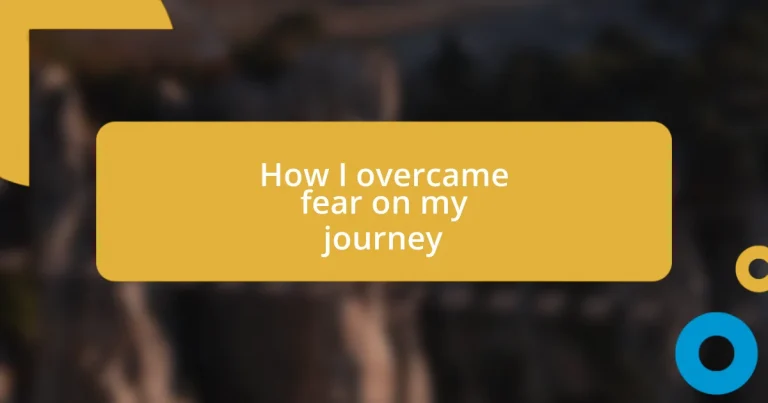Key takeaways:
- Identifying fear triggers and understanding their roots, such as fear of judgment and vulnerability, is crucial for personal growth.
- Developing a personal action plan with clear goals, accountability, and flexibility helps in confronting fears effectively.
- Celebrating small victories and reflecting on personal growth fosters resilience and motivation to face future challenges.
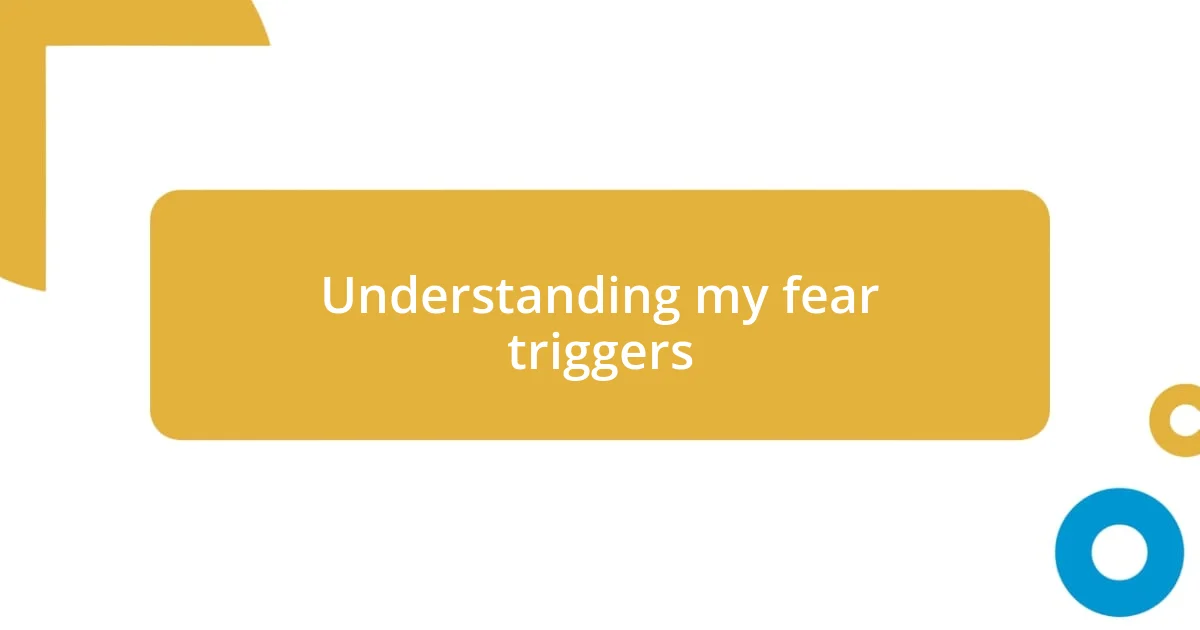
Understanding my fear triggers
Identifying my fear triggers has been a journey in itself. For instance, I remember standing at the edge of a high diving board, heart racing and palms sweating. What was it about that height that made me feel so vulnerable? It dawned on me that losing control was my biggest fear, not just in that moment but in many other aspects of my life.
I also found that certain social situations triggered anxiety for me. Walking into a crowded room, I’d feel an overwhelming urge to retreat. Why did I think everyone was judging me? Reflecting on this, I realized it stemmed from my childhood experiences of being shy. It’s fascinating how past events can shape our present fears, isn’t it?
Another significant trigger for me is the fear of failure. I recall a time when I hesitated to apply for a job I really wanted because I thought, “What if I’m not good enough?” This thought process made me realize that the fear of disappointing myself or others often held me back. It’s a daunting realization, but recognizing these patterns has given me the awareness to confront them head-on.
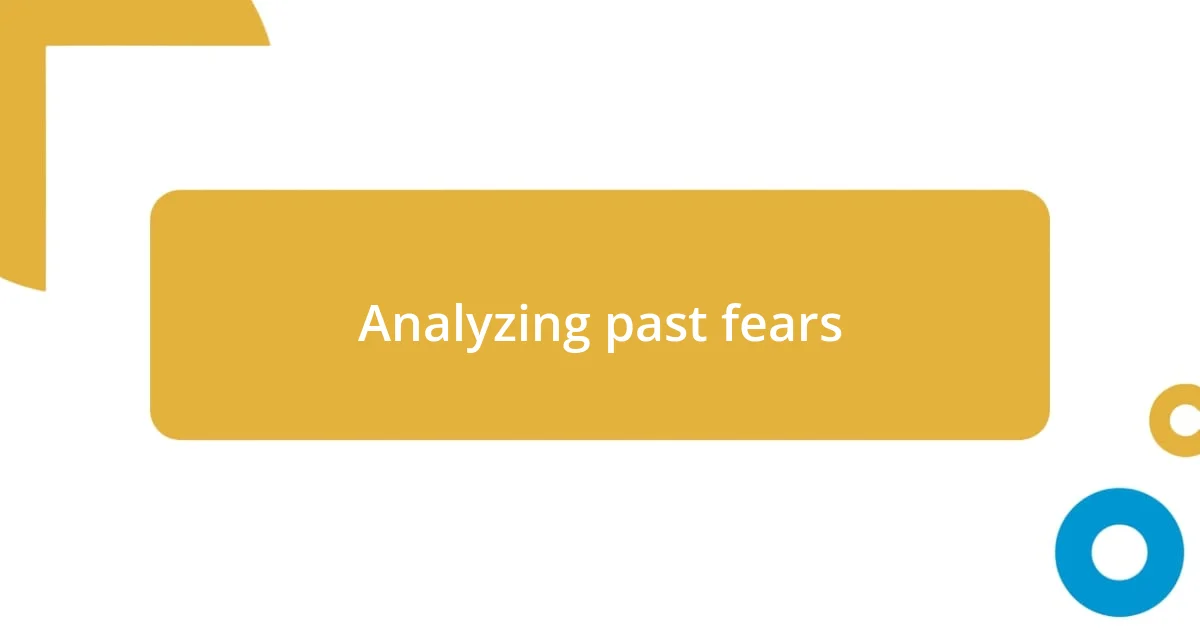
Analyzing past fears
Analyzing my past fears has been an eye-opening experience. I remember vividly the time I stood backstage before giving a speech, my stomach churning with anxiety. In that moment, I realized my fear of public speaking wasn’t just about the act itself; it represented a deeper fear of judgment. I could feel the anxiety creeping in, fueled by memories of feeling overlooked or dismissed during group conversations as a child. This understanding of my personal history illuminated how my past shaped not only my fears but my reactions to them.
To further explore my journey with fear, I’ve noted some recurring themes:
– Fear of judgment: Rooted in feeling shy and overlooked during childhood.
– Fear of vulnerability: Realizing it’s okay to be human and imperfect, especially in front of others.
– Comparison: Often measuring myself against others’ successes, which escalated my anxiety.
– Fear of the unknown: Reflecting on past instances where the uncertainty of outcomes left me paralyzed.
By dissecting these patterns, I’ve gained insights that have stoked my courage to push through. Understanding these fears has been crucial in our journey toward overcoming them.
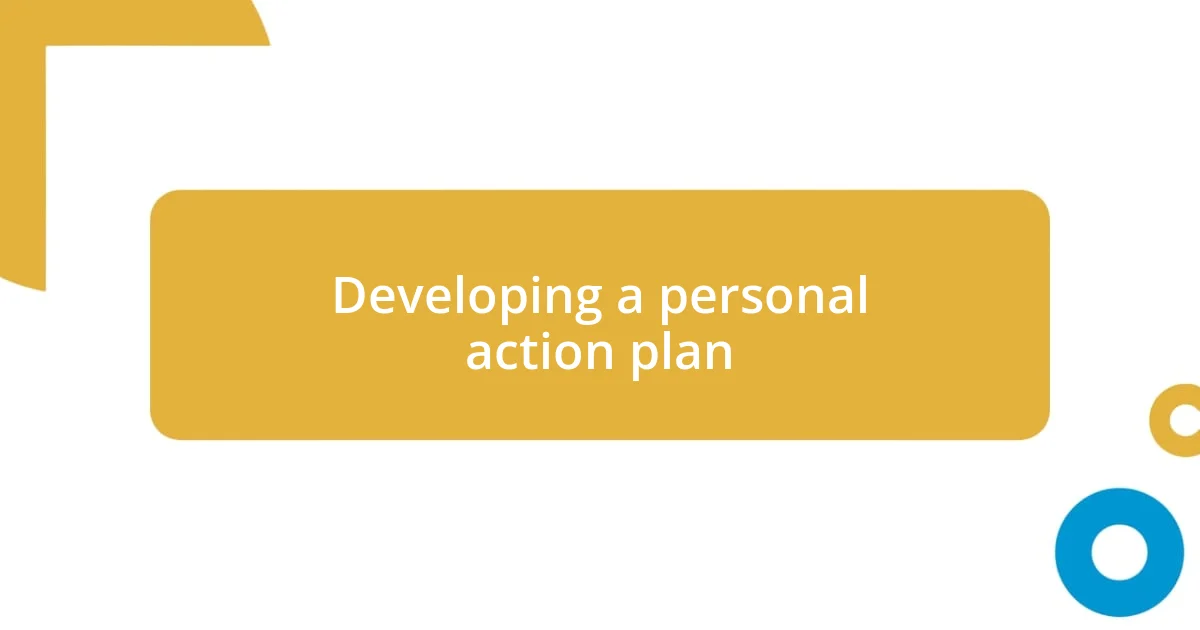
Developing a personal action plan
When it comes to developing a personal action plan, I find it essential to break it down into manageable steps. For me, one effective approach was to write down specific goals I wanted to tackle. I remember creating a vision board that served as a constant reminder of my aspirations and the fears I aimed to conquer. It was a powerful visual representation of my journey, reinforcing my commitment every day.
Next, I incorporated accountability into my action plan. I reached out to a friend who I knew would support me and, frankly, challenge me. Whenever I felt like backing down from my goals, our regular check-ins provided the motivation I needed. Having someone to share my progress with felt like I was sharing a burden and a joy, making the challenges feel less daunting.
Lastly, I emphasized the importance of flexibility in my plan. Life is unpredictable, and I learned that setbacks are part of the process. For instance, I once had a panic attack before a major presentation. Rather than abandoning my plan, I took a step back, reassessed my strategies, and allowed myself to adapt. This experience taught me that resilience often comes from being kind to myself and recognizing that fear doesn’t mean failure—it merely means I’m on the right track to growth.
| Component | Description |
|---|---|
| Goal Setting | Defining specific fears and aspirations through visual representation. |
| Accountability | Involving a supportive friend to keep me motivated and accountable. |
| Flexibility | Adapting my plan as challenges arise, reminding myself that setbacks can lead to growth. |
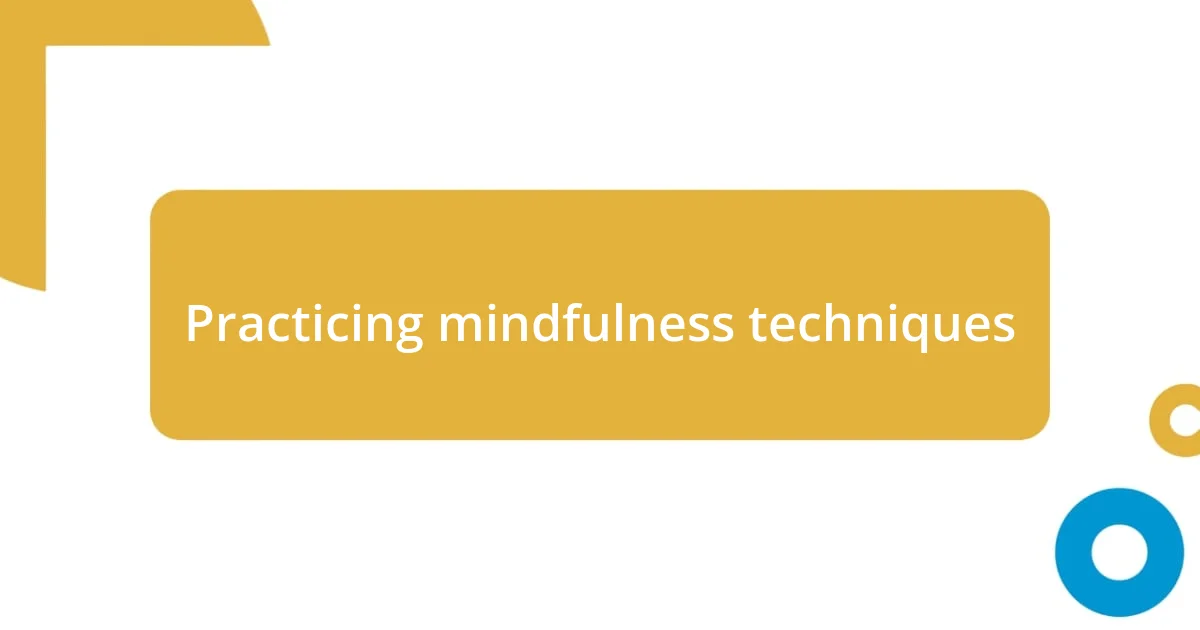
Practicing mindfulness techniques
Incorporating mindfulness techniques into my daily routine was a game-changer for me. I remember the first time I sat quietly, focusing solely on my breath. At first, my mind was a chaotic swirl of thoughts, but with practice, I learned to acknowledge those distractions without judgment. This simple act of tuning into my breathing became a lifeline in moments of fear.
As I explored mindfulness further, I discovered the power of guided meditation. I often listened to soothing recordings that helped me visualize a safe space, one where my fears couldn’t touch me. This practice felt comforting, like wrapping myself in a warm blanket during a storm. It made me realize that fear loses its grip when we pause and really tune into the present moment.
I also embraced mindful walking as a way to connect with my surroundings. With every step, I focused on how my feet felt on the ground and the sensations around me. It was a wonderful way to distract myself from anxious thoughts, allowing me to be fully present. Have you ever tried walking mindfully? I can attest to its ability to shift my mood and calm my nerves—it’s like stepping into a new world, one where fear takes a back seat.
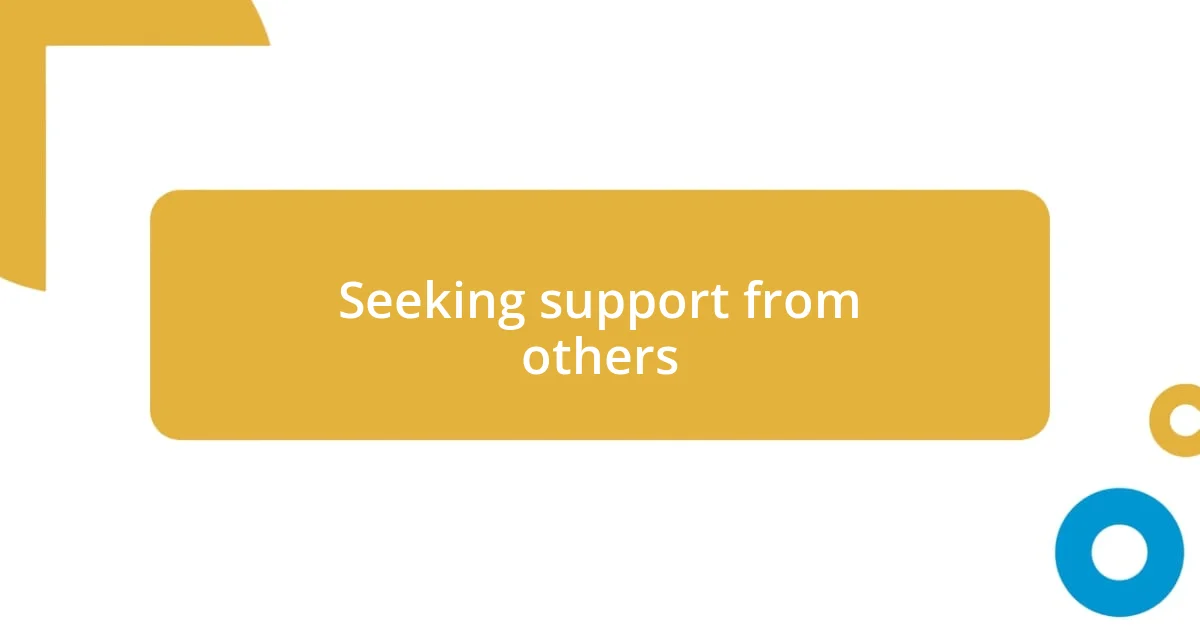
Seeking support from others
I’ve often found that reaching out for support can really lighten the load. There was a time when I hesitated to share my struggles, thinking that it was a sign of weakness. But when I opened up to a close friend about my fears, it turned out to be one of the most liberating experiences I’d ever had. Their empathy not only validated my feelings but also provided me with new perspectives that I hadn’t considered before. Have you ever experienced that moment when sharing your fears feels like taking a breath of fresh air?
Sometimes, finding a community can be a powerful ally on this journey. I remember joining a local support group where people openly shared their experiences with fear, and it felt incredibly reassuring. Seeing whether others grappled with similar challenges made me realize I was not alone. If I stumbled, someone else picked me up, and vice versa. It was like creating our little safety net, where vulnerability became strength.
Additionally, I learned that seeking professional help can be invaluable. When I finally decided to talk to a therapist, it opened doors to insights that I wouldn’t have reached on my own. We explored my fears in a safe space, breaking down barriers I thought would remain forever. Through this experience, I understood the importance of investing in my emotional well-being. Have you considered how a little external support might transform your own journey?
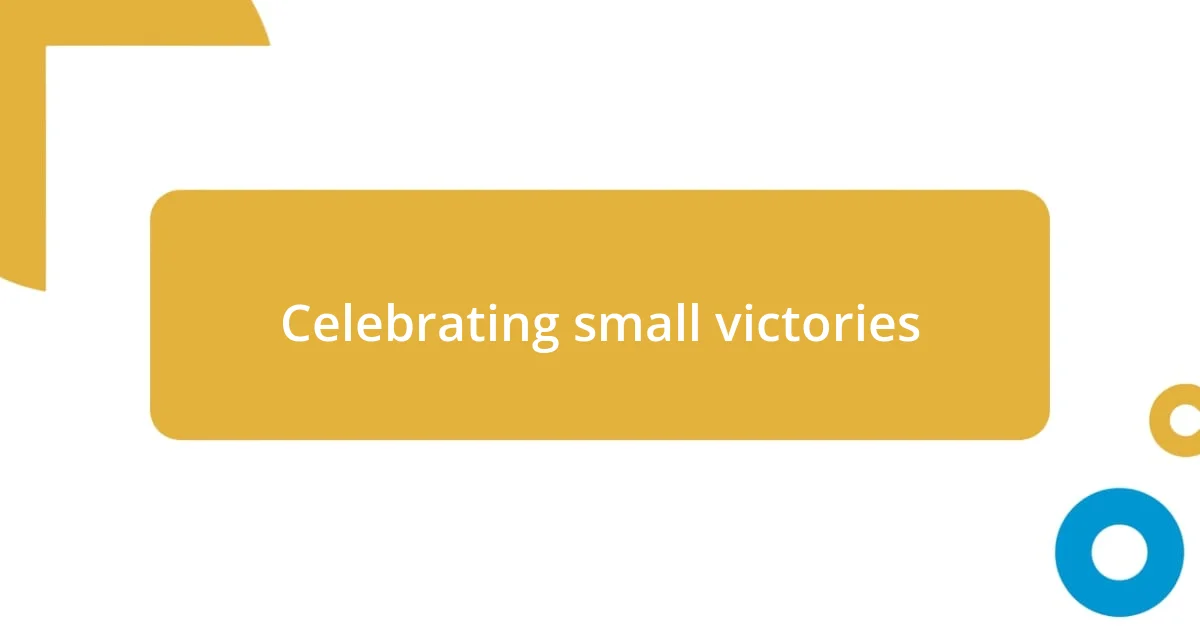
Celebrating small victories
Celebrating small victories played a crucial role in my journey. I remember one particular day when I decided to face a fear I’d been avoiding: public speaking. Just speaking up in a small team meeting felt monumental. After I shared my thoughts, I felt a rush of pride wash over me, like I had conquered a small dragon. It was exhilarating to acknowledge that moment rather than brushing it aside.
I realized that each time I celebrated a small win, I built momentum. Even something as simple as waking up early to meditate felt significant. Those little moments of success made it easier to tackle the larger challenges ahead. It’s intriguing, isn’t it? When we take a step back to appreciate our progress, it transforms our mindset. Suddenly, every obstacle feels more manageable.
I found that keeping a journal devoted to these victories was incredibly empowering. I would jot down each success, no matter how trivial it seemed at the time. Whenever I read through those entries, I felt a swell of gratitude and motivation. Why not try it yourself? A simple moment of reflection can illuminate just how far you’ve come and ignite a fire within you to keep pushing forward.
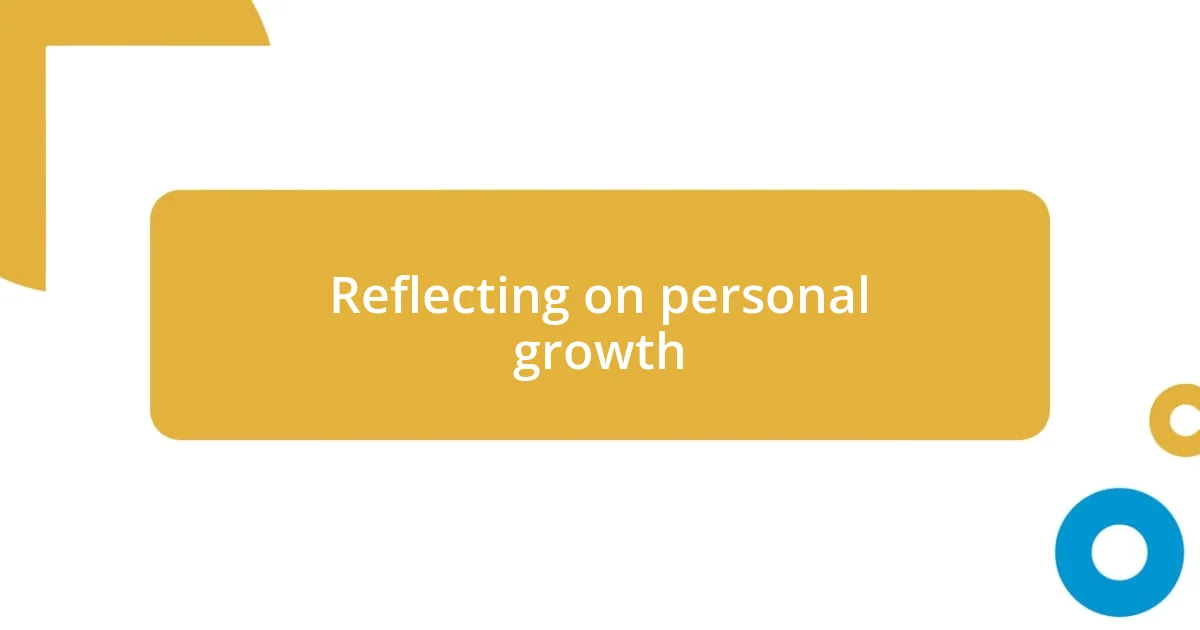
Reflecting on personal growth
Reflecting on personal growth often invites a whirlwind of emotions. I vividly recall a time when I looked back at the initial moments of my journey, and I was surprised by how naive I used to be about my fears. It felt like flipping through an old photo album, remembering the exact feelings of uncertainty and vulnerability. Have you ever felt that nostalgic mix of pride and disbelief as you see how far you’ve come?
As I reflected, it struck me how essential it is to recognize the lessons learned along the way. Each experience, even the painful ones, taught me valuable insights about my resilience and strength. For instance, there were moments when I stumbled and thought I might retreat into my shell again. Yet, I found those setbacks often birthed clarity and determination. I can’t help but wonder—doesn’t acknowledging our growth give us the power to move forward with confidence?
Moreover, I discovered that reflecting on my growth can sometimes feel like standing at the edge of a cliff, peering into a vast landscape of possibilities. Looking back, I often think of the challenges that seemed insurmountable at the time, and I marvel at how they shaped my character. It’s not just about the milestones but the journey itself that builds us. What if we took a moment to celebrate not just our victories but the rugged terrains that brought us here? Wouldn’t that deepen our appreciation for our journey?

